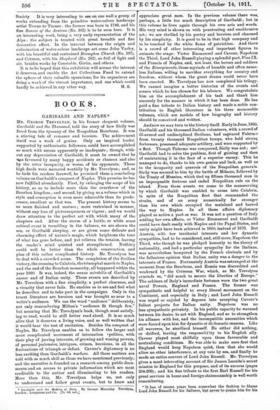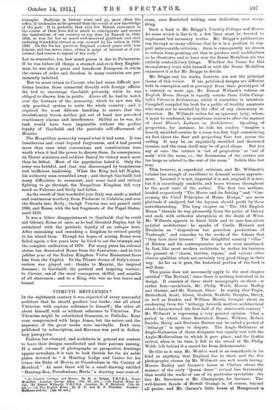BOOKS.
GARIBALDI AND NAPLES.*
Mn. GEORGE TREVELYAN, in his former eloquent volume, Garibaldi and the Thousand, told the story of how Sicily was freed from the tyranny of the Neapolitan Bourbons. It was a stirring tale of romance and heroism. The achievement itself was a work of genius. Only an inspired leader, supported by enthusiastic followers, could have accomplished so much with means apparently so inadequate ; though, with- out any depreciation of Garibaldi, it must be owned that he
as favoured by many happy accidents or chances and also
by the utter incapacity, or worse, of his opponents. These high deeds were narrated worthily by Mr. Trevelyan; and, as he bade his readers farewell, he promised them a concluding volume on Garibaldi's conquest of Naples. This promise he has now fulfilled abundantly. First, by enlarging the scope of his history, so as to include more than the overthrow of the Bourbon kingdom ; and second, by giving us a volume which in style and conception is even more admirable than its prede- cessor, excellent as that was. The present history seems to us more finished and mature ; more restrained in manner, without any loss of picturesqueness or rigour; and we would draw attention to the perfect art with which many of the chapters end. After the storm of a battle, or while some critical event is trembling in the balance, we are shown the sea, or Garibaldi sleeping, or are given some delicate and charming effect of nature's magic, which heightens the tone of what has gone before, and yet relieves the tension, leaving the reader's mind quieted and strengthened. Nothing could well be better than the whole construction and plan of this rather complicated history. Mr. Trevelyan has to deal with a crowded scene. The completion of the Sicilian victory, the crossing to Calabria, the triumphal march to Naples, and the end of the Bourbon monarchy, all happened within the year 1860. It was, indeed, the annus mirabilis of Garibaldi's career and of Italian unity. These events are described by Mr. Trevelyan with a fine simplicity, a perfect clearness, and a vivacity that never fails. He enables us to see and feel what he describes and to take part in the campaigns. Only in the truest literature are heroism and war brought so near to a writer's audience. We use the word "audience" deliberately,
not only remembering Milton's "audience fit though few," but meaning that Mr. Trevelyan's book, though most satisfy- ing to read, would be still better read aloud. It is so much alive that it deserves a living voice, and so well written that it would bear the test of recitation. Besides the conquest of Naples, Mr. Trevelyan enables us to follow the larger and more complicated movement of internation ;politics, with their play of jarring interests, of growing and waning powers, of personal jealousies, intrigues, crimes, heroisms, in all the fluctuations of triumph or defeat. Qavour's diplomacy is no less exciting than Garibaldi's warfare. All these matters are told with as much skill as those we have mentioned previously; and the narrative is founded on a research among public docu- ments and an access to private information which are most creditable to the author and illuminating to his readers. More than this, Mr. Trevelyan helps us, not only to understand and follow great events, but to know and
• Garibaldi and the Making of Italy. By George Macaulay Trevelyan. London: Longinans and Co. gs. 6d. net.]
appreciate great men. In the previous volume there was, perhaps, a little too much description of Garibaldi ; but in this volume he lives again through his own acts and words.
His very mind is shown us with penetrating and unobtrusive art ; we are thrilled by his poetry and heroism and charmed
by his simplicity. It is good to be in that high company and to be touched by the white flame of patriotism. And there is a crowd of other interesting and important figures to animate the stage: Victor Emmanuel and Cavour, Napoleon the Third, Lord John Russell playing a splendid part, Pius IX. and Francis of Naples, and, not least, the heroes and soldiers of the Bisorgimento, those myriads of humble and often name- less Italians, willing to sacrifice everything for country and freedom, without whom the great drama could never have been enacted. Mr. Trevelyan has now completed his trilogy. We cannot imagine a, better historian of the events and scenes which he has chosen for his labours. We congratulate him on the accomplishment of his task and thank him sincerely for the manner in which it has been done. He has paid a fine tribute to Italian history and made a noble con- tribution to English literature in his three memorable volumes, which are models of bow biography and history should be conceived and written.
An dnow we may turn to the history itself. Early in June, 1860, Garibaldi and his thousand Italian volunteers, with a crowd of ill-armed and undisciplined Sicilians, had captured Palermo from twenty thousand Neapolitan troops, who held strong fortresses, possessed adequate artillery, and were supported by a fleet. Though Palermo was conquered, Sicily was not ; anit Garibaldi bad to solve the problem, first of gaining and then of maintaining it in the face of a superior enemy. This he managed to do, thanks to his own genius and luck, as well as to the incapacity and quarrels of the Neapolitan generals. Sicily was secured to him by the battle of Milazzo, followed by the Treaty of Messina, which tied up fifteen thousand men in an impregnable fortress and ended Neapolitan rule on the island. From these events we come to the manomvring by which Garibaldi was enabled to cross into Calabria, in spite of the Neapolitan fleet that commanded the straits, and of an army numerically far stronger than his own which occupied the mainland and barred the way to Naples. In all these affairs diplomacy played as active a part as war. It was not a question of Italy settling her own affairs, or Victor Emmanuel and Garibaldi could have dealt easily with Naples and the Papal States, and unity might have been achieved in 1860, instead of 1870. But Austria, with her territorial interests and her dynastic sympathies, bad to be considered, and, still more, Napoleon the Third, who though he was pledged honestly to the theory of nationality, and had a particular sympathy for the Italians, was nevertheless hampered by the French clericals and by the fallacious opinion that Italian unity was a danger to the interests of France. Fortunately Austria was estranged at the moment from the Bourbons, and Russia was discredited and weakened by the Crimean War, which, as Mr. Trevelyan reminds us, "did much to secure the liberties of Europe." The arbiters of Italy's immediate fortunes were the two great
naval Powers, England and France. The former was sympathetic and helpful to every liberal movement on the Continent, and especially in Italy ; and Lord John Russell was urged or cajoled by degrees into accepting Cavour's fullest projects for Italian unity. Napoleon was no less sympathetic privately. In his public capacity he wavered between his desire to act with England, and so to strengthen his alliance with her, and the incompatible necessities which were forced upon him for dynastic or diplomatic reasons. Like all waverers, he sterilized himself. He either did nothing, or drifted, leaving the responsiLi!ity to his English ally.
Cavour played most skilfully upon these favourable and neutralizing conditions. He was able to make sure first that England would keep Napoleon quiet, then that she would allow no other interference, at any rate by sea, and finally he made an entire convert of Lord John Russell. Mr. Trevelyan gives a most interesting account of Sir James Lacaita's secret mission to England for this purpose, and of its success (pages 204-209); and his fine tribute to the first Earl Russell for his great services in home and foreign statesmanship is well worth remembering.
"It has of recent years been somewhat the fashion to blame Lord John Russell for his failure; InIt tteve T to praise him for his triumphs. Fashions in history come and go, more often the reflex of tendencies in the present than the result of new knowledge of the past. It is probable that very few British statesmen in the course of their lives did as much to reinvigorate and secure the institutions of our country as was done by Russell in 1830- 1832, or won for her as much well-deserved gratitude and such enduring friendship abroad as was secured by his action in 1859- 1860. On the Ita ian question England secured peace with true honour, and has never since, either in point of interest or of con- science, had reason to repent of her work."
Let us remember, too, how much praise is due to Palmerston. If he was before all things a staunch and even fiery English-
man, he was also a great and beneficent European, to whom the causes of order and freedom in many countries are per- manently indebted.
But we must return to Cavour, who had many difficult pro- blems besides those connected directly with foreign affairs. He bad to encourage Garibaldi privately, while he was obliged to disown him in public. Above all, he had to watch over the fortunes of the monarchy, which he saw was the only practical system to unite the whole country ; and it required the most delicate handling to ensure that the revolutionary forces neither got out of band nor provoked reactionary alarms and interference. Skilful as he was, his task would have been impossible without the perfect loyalty of Garibaldi and the patriotic self-effacement of Mazzini.
The Neapolitan monarchy reaped what it had sown. It was treacherous and cruel beyond forgiveness, and it had proved more than once what concessions and constitutions were worth when it had the power to disown them. In consequence, its liberal ministers and soldiers feared its victory much more than its defeat. Most of the population bated it. Only the army was faithful, and that was discouraged by treacherous and inefficient leadership. When the King had left Naples, his authority soon crumbled away ; and though Garibaldi had many difficulties to surmount, and some hard and critical fighting to go through, the Neapolitan Kingdom fell very much as Palermo and Sicily had fallen.
As the result of that wonderful year Italy was made a united and continuous territory, from Piedmont to Calabria, and over the Straits into Sicily ; though Venetia was not gained until 1866, and Rome, with the last fragments of the Papal States, until 1870.
It was a bitter disappointment to Garibaldi that he could not liberate Rome at once, as he bad liberated Naples, but he submitted with the patriotic loyalty of an antique hero. After unmaking and remaking a kingdom he retired quietly to his island farm. Though his hopes of seizing Rome were foiled again, a few years later be lived to see the triumph and the complete unification of 1870. For many years his colossal statue has dominated Rome from the Janiculuni ; and in this jubilee year of the Italian Kingdom Victor Emmanuel faces him from the Capitol. So the Titanic drama of Italy's resur- rection was played out : thanks to Mazzini, the inspired dreamer ; to Garibaldi, the poetical and inspiring warrior; to Cavour, one of the most courageous, skilful, and sensible of all statesmen ; and to a King who was no less brave and honest.



















































 Previous page
Previous page